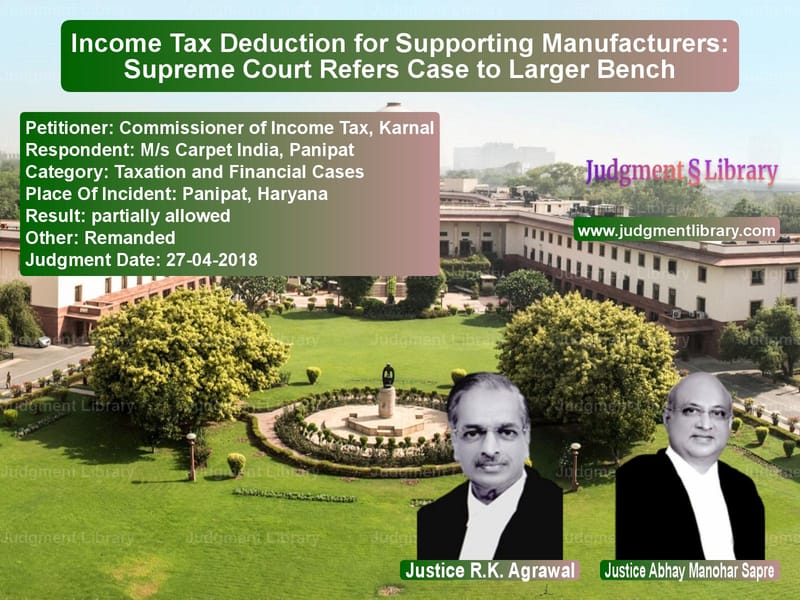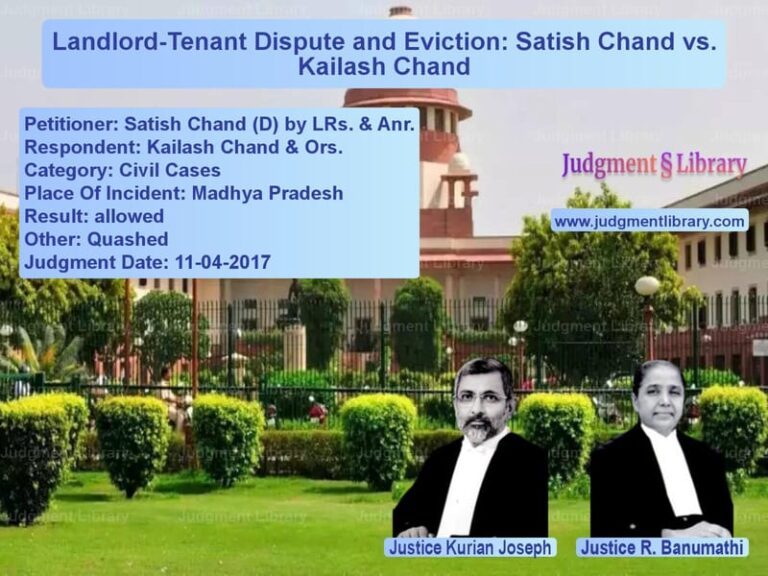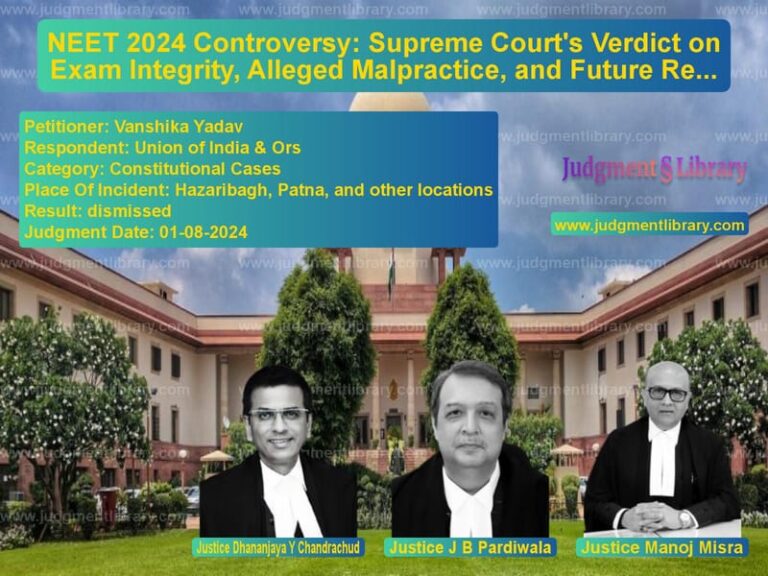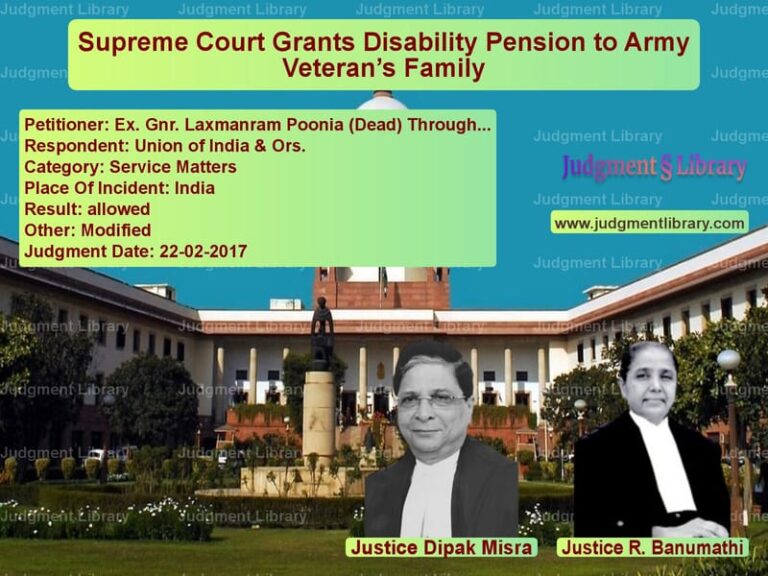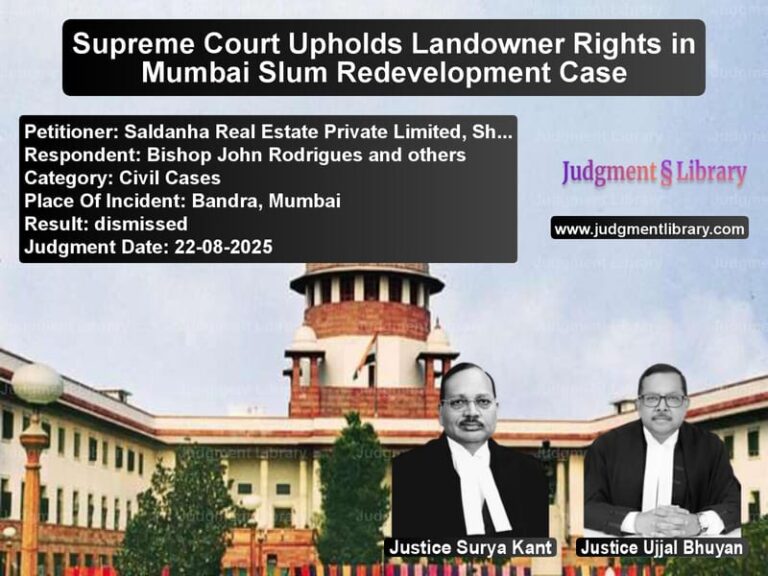Income Tax Deduction for Supporting Manufacturers: Supreme Court Refers Case to Larger Bench
The case of Commissioner of Income Tax, Karnal v. M/s Carpet India, Panipat involved a crucial interpretation of Section 80HHC of the Income Tax Act, 1961, regarding whether supporting manufacturers who receive export incentives such as Duty Drawback (DDB) and Duty Entitlement Pass Book (DEPB) can claim the same tax deductions as direct exporters. The Supreme Court was called upon to decide if supporting manufacturers are entitled to deductions at par with direct exporters, an issue with significant monetary implications.
Background of the Case
The respondent, M/s Carpet India, Panipat, is a partnership firm engaged in the manufacturing and sale of carpets, primarily supplying its goods to M/s IKEA Trading (India) Ltd., an export house. For the Assessment Year (AY) 2001-2002, the assessee filed a ‘Nil’ return, claiming deductions under Section 80HHC amounting to Rs. 1,57,68,742/- on export profits of Rs. 1,97,10,927/-, arguing that they should be treated at par with direct exporters.
The Assessing Officer, however, allowed only Rs. 1,08,96,505/- as deduction, rejecting the claim that supporting manufacturers were entitled to the same benefits as direct exporters. This led to a series of appeals before various tax authorities, the High Court, and eventually, the Supreme Court.
Arguments by the Appellant (Commissioner of Income Tax)
The Revenue’s counsel argued:
- The assessee is a supporting manufacturer supplying goods to an export house, not a direct exporter.
- Section 80HHC was initially designed for direct exporters; deductions for supporting manufacturers were added later and should not be on par with direct exporters.
- The High Court erred in treating export incentives as equivalent to premiums paid by export houses to supporting manufacturers.
- The case relied upon by the High Court, Commissioner of Income Tax v. Baby Marine Exports, dealt with a different issue and was not applicable.
Arguments by the Respondent (M/s Carpet India)
The respondent countered:
- As a supporting manufacturer, they were part of the export process and should receive deductions under Section 80HHC.
- The High Court correctly relied on Baby Marine Exports, which allowed deductions for supporting manufacturers.
- Legislative amendments to Section 80HHC intended to extend export benefits to supporting manufacturers.
Supreme Court’s Judgment
1. The Nature of Section 80HHC
The Court observed that Section 80HHC aims to promote exports and incentivize Indian manufacturers by allowing tax deductions. Initially, these deductions were available only to direct exporters. Later amendments extended benefits to supporting manufacturers selling goods to export houses.
2. Different Treatment for Direct and Supporting Manufacturers
The Court examined whether supporting manufacturers should be treated at par with direct exporters when claiming deductions for export incentives such as DDB and DEPB.
“The legislature divided Section 80HHC into two categories: direct exporters and supporting manufacturers. The question before us is whether supporting manufacturers receiving export incentives should enjoy the same deductions as direct exporters.”
3. Review of Previous Case Law
The Court considered the judgment in Baby Marine Exports, which had ruled in favor of supporting manufacturers. However, it noted that the issues in the current case were distinct:
“The High Court relied on Baby Marine Exports, but that case dealt with export house premiums, not export incentives like DDB and DEPB. The issues in the present case require independent analysis.”
4. The Need for Larger Bench Consideration
The Court determined that the question of whether supporting manufacturers should receive the same deductions as direct exporters had significant legal and financial implications.
“Given the complexity and impact of this issue, we refer the matter to a larger bench to decide whether supporting manufacturers can claim deductions at par with direct exporters.”
Final Ruling
The Supreme Court referred the case to a larger bench for final determination and ruled:
- Supporting manufacturers’ entitlement to export incentives under Section 80HHC requires further deliberation.
- The High Court’s reliance on previous case law needs re-examination.
- Pending the larger bench’s decision, deductions for supporting manufacturers remain subject to review.
Key Takeaways from the Judgment
- Section 80HHC was originally intended for direct exporters but was later extended to supporting manufacturers.
- There is ambiguity regarding whether supporting manufacturers should receive the same deductions as direct exporters.
- The Supreme Court referred the matter to a larger bench for final resolution.
- Future tax assessments for supporting manufacturers may be impacted by the larger bench’s decision.
Conclusion
The Supreme Court’s decision to refer the case to a larger bench highlights the complexities of tax deductions for supporting manufacturers. The ruling will have wide-ranging implications for businesses engaged in exports and those benefiting from incentives under Section 80HHC. The final verdict by the larger bench will be crucial in determining how tax benefits are applied to supporting manufacturers moving forward.
Petitioner Name: Commissioner of Income Tax, Karnal.Respondent Name: M/s Carpet India, Panipat.Judgment By: Justice R.K. Agrawal, Justice Abhay Manohar Sapre.Place Of Incident: Panipat, Haryana.Judgment Date: 27-04-2018.
Don’t miss out on the full details! Download the complete judgment in PDF format below and gain valuable insights instantly!
Download Judgment: Commissioner of Inco vs Ms Carpet India, Pa Supreme Court of India Judgment Dated 27-04-2018.pdf
Direct Downlaod Judgment: Direct downlaod this Judgment
See all petitions in Income Tax Disputes
See all petitions in Tax Refund Disputes
See all petitions in Customs and Excise
See all petitions in Judgment by R K Agrawal
See all petitions in Judgment by Abhay Manohar Sapre
See all petitions in partially allowed
See all petitions in Remanded
See all petitions in supreme court of India judgments April 2018
See all petitions in 2018 judgments
See all posts in Taxation and Financial Cases Category
See all allowed petitions in Taxation and Financial Cases Category
See all Dismissed petitions in Taxation and Financial Cases Category
See all partially allowed petitions in Taxation and Financial Cases Category

